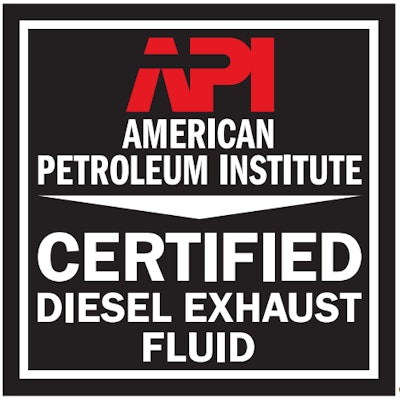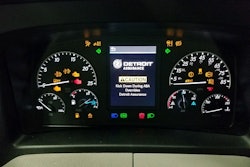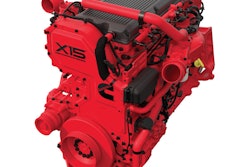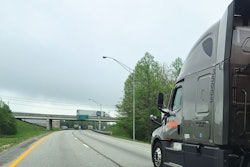This month marks the 10th anniversary of the American Petroleum Institute’s voluntary program for certification of diesel exhaust fluid‘s quality. Essentially, the program is modeled on the API’s similar, decades-old quality-certification program for engine oils, well-known as a valuable marker for oil buyers to know that what they’re getting is up to spec.
For much of those first 10 years, the DEF quality-cert team lead at the API, Jeff Harmening, has worked to refine the program, which he calls in its conception a quality-control effort to “create this brand-new industry out of thin air and have it be successful.” That brand-new industry — the sale and use of DEF for EPA 2010-emissions-spec engines with selective catalytic reduction (SCR) exhaust aftertreatment systems.
With plenty new players getting into the business of DEF production at the time, “the marketers knew we had a [certification] program in place for engine oils that was reliable and globally accepted,” Harmening says. With concerns about DEF quality growing, “marketers asked us to put that together to ensure quality DEF in the marketplace that consumers could easily find.”
 This certification mark goes on DEF products that have been tested for urea concentration levels and a variety of other things to ensure it meets the ISO spec.
This certification mark goes on DEF products that have been tested for urea concentration levels and a variety of other things to ensure it meets the ISO spec.The program, however, is a completely voluntary one that is funded in part by participating marketers (they pay a fee to license their products through it), and not all DEF sellers participate. (You can access the current list of licensees whose products are part of the program via this link.) You’ll know the product is certified when you see the mark shown here on DEF sold in containers, but at bulk distribution points at truck stops, fuel stations and on fleet yards, it like as not won’t be obvious.

Issues that can arise with out-of-spec DEF include the perhaps most obvious one — improper urea concentration, which at a drastic-enough level can trigger a derating of the engine. As I’ve written before, this often happens not as a result of anything the DEF manufacturer did in formulating the product, but rather follows from longer-term storage at high or low temperatures, particularly problematic at high temps.
High temperatures over enough time can degrade the DEF and throw off the urea concentration, giving any DEF so stored a “shelf life, Harmening says. “If stored above 86 degrees Fahrenheit, recommended [maximum] storage time above 86 is about 12 months. For those guys hauling a jug just in case they’re out on the middle of nowhere” with a need to fill, “that may be off-spec DEF by the time they crack the seal.”
Cold-weather isn’t really an issue, he says, given DEF is formulated at 32.5 percent urea and the rest distilled water for the reason that, at that level of concentration, both substances freeze and thaw at the same time. Thus “you don’t have to worry about the concentration being off” in a cold area when your tanks freeze.
What too many truckers aren’t aware of, says Harmening, is that off-spec DEF, particularly if formulated using non-purified water from a public system, can contain a “whole mess of solubles and other metals considered to be contaminants” that may harm equipment. Deposits can form on the injectors that spray DEF into the exhaust stream, he says. “Metals can then harm the SCR catalyst itself.” Replacing it could be a hefty cost indeed, certainly in the thousands, not including the necessary downtime.
Some vehicle OEMs, even, have gone so far as to “mandate use of API-licensed diesel exhaust fluid,” says Harmening, making easy access to any marketer’s program status even more important.
As noted earlier, it’s not always obvious whose DEF is coming out of a bulk pump — for those who buy in bulk, further, there’s no requirement from the National Conference on Weights and Measures, which writes the rules for dispensing, that such buyers disclose the producer to the end consumer. Sometimes, those bulk buyers may not know the producer themselves, Harmening says. NCWM regs that are automatically adopted by about half of U.S. states do require, at least, bulk distributors to report to bulk buyers “at a minimum the producer and the marketer” of the fluid.
But in the API’s aftermarket audit program for their DEF-quality certification, in which they purchase and test DEF from sites all around the country, among other efforts, “I’ve been paying attention to a lot of our receipts,” Harmening says. “Very few sellers … spell out” just who the DEF’s producer is. “That makes it very hard for a driver to know they’re getting an API-licensed product. It’s an issue we’d like to see addressed,” whether by regulatory requirement or other means, he says.
“We could get further regulations to extend mandatory reporting on brand names at the dispenser level,” Harmening adds. “In the engine oil industry that is a requirement. … We’d like something similar to that for DEF as well.”
In the meantime, Harmening adds, conversations with licensees among diesel-exhaust-fluid marketers have been under way recently toward potentially offering a decal “to put on the dispenser at the fill-up location” advertising the API certification mark where warranted. The decal would display required language relative to the DEF spec, the certification mark and a code that a driver could “scan and go directly to the licensee directory.”












